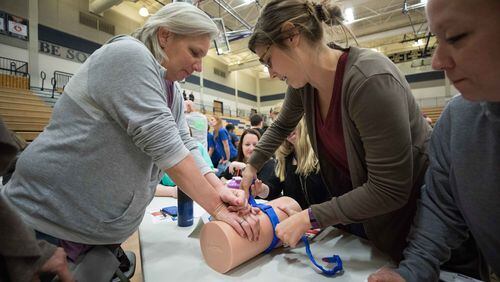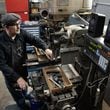Since the mass school shooting in 1999 at Columbine High School in Colorado, law enforcement, school administrators, parents, teachers, students and communities have sought ways to lessen the casualties from that type of incident or prevent it altogether.
The Marietta Police Department partnered with WellStar Kennestone Hospital Trauma Center and offered an active-shooter training seminar Monday, Feb. 26 at Marietta High School. With so many types of training out there, the two entities used what they believe is among the most effective.
Civilian Response to Active Shooter Events is a course designed by the Advanced Law Enforcement Rapid Response Training program at Texas State University. Law enforcement officials teach CRASE to civilians in schools, businesses or the public.
Stop the Bleed is a nationwide program launched in 2015 by the White House. Attendees are taught how to help someone bleeding uncontrollably. It is intended to cultivate grassroots efforts that encourage bystanders to become trained, equipped,and empowered to help in an emergency before professional help arrives. Last year, Georgia joined the effort. The campaign has been funded to equip all Georgia public schools with bleeding-control kits. At least 10 staff members at a school have to have taken the training to qualify for the free kits.
In a shooting incident, it can be hours before EMTs are allowed to enter the scene and render aid. If bleeding is severe, it can kill within minutes, potentially before trained responders arrive. Research has shown that bystanders, with little or no medical training, can become heroic lifesavers. Similar to the use of CPR or automatic defibrillators, improving public awareness about how to stop severe bleeding can be the difference between life and death for an injured person.
Information can be found at stopthebleedgeorgia.org
About the Author







